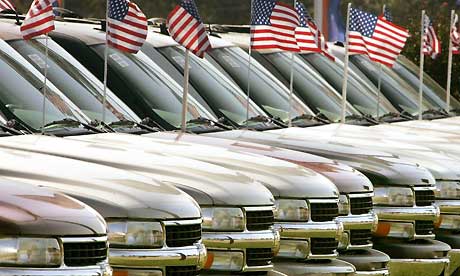US bails out General Motors-related company GMAC with further $3.8bn
• Third bailout brings total to $16.3bn and government control
• GMAC heavily connected with sub-prime mortgages
The United States government has pumped a further $3.8bn (£2.35bn) into GMAC, giving it a controlling stake in the former finance arm of General Motors, which had been heavily involved in sub-prime mortgages.
The latest bailout is the third injection of cash into the troubled finance business since December 2008, taking the taxpayers' total outlay in the company to $16.3bn. The further support raises the government's stake from 35% to 56%.

Receiving its third government bailout, GMAC is the the former finance arm of General Motors and is heavily connected with sub-prime mortgages. Photograph: AP
The money is being made available through the government's $700bn troubled asset relief programme (Tarp), created to strengthen the financial sector in the wake of the credit crisis. GMAC is continuing to struggle even as other banks are rushing to pay money back to the Treasury, to escape restrictions imposed by the Tarp programme on issues such as hiring and pay. GMAC lost $5.3bn in the first nine months of the year.
The company is struggling with huge losses in its residential mortgage business and is considering either closing or selling the division. It disclosed this week that it would take an additional $3.3bn in mortgage-related writedowns in the fourth quarter, a reminder that the home loans crisis behind the credit crunch still has further to play out.
The survival of GMAC is considered a crucial part of the Obama administration's efforts to rescue the ailing US motor industry, as the lender provides financing to thousands of GM and Chrysler auto dealers, allowing them to stock their showrooms with vehicles.
The auto financing division by contrast has been improving and posted a profit of $395m during the third quarter, despite sales of cars and lorries falling 24% in the US last year. The group also owns an online consumer bank, Ally Bank, which has been attracting billions in deposits by offering a high interest rate to savers.
GMAC was granted bank holding status a year ago, allowing it to participate in the Tarp scheme. But it failed a government stress test, largely because of the losses in the mortgage business, forcing it to raise a further $11.5bn in capital. When it failed to do so, the government was forced to step in again.
The Treasury will now have the right to appoint four directors to the board, but said it would leave day-to-day running of the business in management hands. Chief executive Al de Molina resigned in November and was replaced by Michael Carpenter, a former Citigroup executive.
"By protecting the financial performance and strength of our core automotive finance operations, we expect to increase the pace at which we can fully repay the US taxpayer," Carpenter said in a statement. He said the capital injection would stabilise the business and enable it to pursue strategic options for the mortgage division.

No comments:
Post a Comment